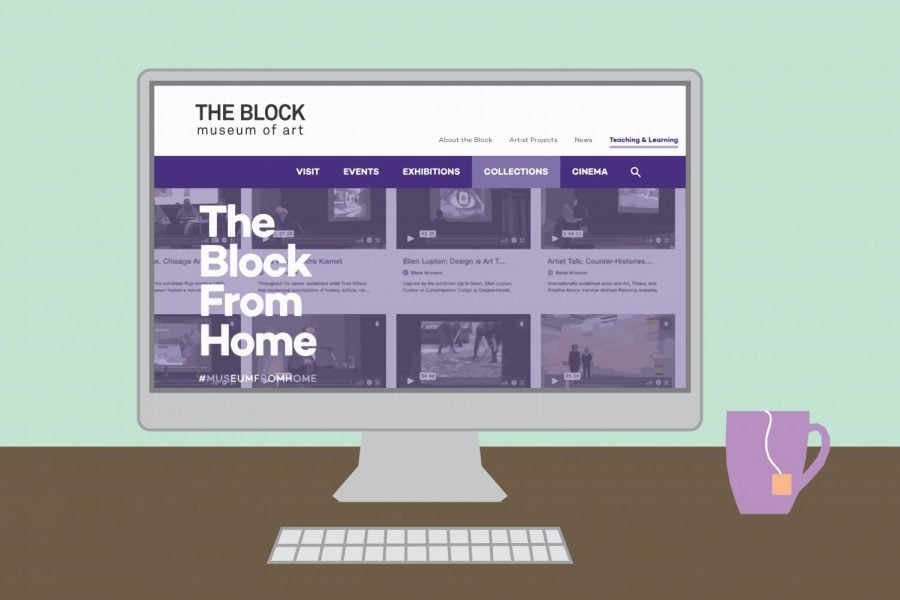Block Museum opens digital doors to art engagement online
Lindsay Bosch, senior manager of marketing and communications, said she sees the current reliance on digital materials as an opportunity for the museum to advance its online offerings.
April 19, 2020
On a typical weekday afternoon, Evanston residents, Northwestern students and professors stroll through rooms in the Block Museum and examine the art. However, after NU closed campus facilities due to the coronavirus pandemic, the Block was suddenly empty, unable to welcome visitors to engage with exhibits in-person.
While the Block has temporarily closed its physical doors, it has opened new ones online. Lindsay Bosch, senior manager of marketing and communications, said the museum built a page on its website called “The Block from Home,” which highlights some of the museum’s “favorite things” from the past few years. It showcases a selection of podcasts, blog posts and videos, as well as artist talks and links to essays and other publications.
“The Block’s archive has always existed, but there’s not always time during a normal quarter to point audiences towards it,” Bosch said. “Now, there is.”
When deciding how to serve its community digitally, Bosch said the museum staff thought about immediate needs — like resources for students and professors — as well as how to define the Block in the digital space overall. Bosch said she sees the current reliance on digital materials as an opportunity for the museum to advance its online offerings.
“We believe in the first-person experience with a work of art,” Bosch said. “But expanding our online services will push our capacities as a museum.”

(Photo courtesy Lindsay Bosch) The Block Museum is working to help people engage with its collection at home during the pandemic. A specific page on its website showcases a selection of podcasts, blog posts and videos.
The Block also utilizes social media to share works from collections in its archive. It uses the hashtag #MuseumFromHome when it posts images on its pages. This hashtag is being used by museums around the country during the pandemic to help audiences virtually interact with different works. Bosch said the hashtag allows the Block to be a part of a national conversation with museums during this time.
The Block usually works with professors to integrate art into their curriculum and arrange visits to the museum during class time. Since classes have moved online, Melanie Garcia Sympson, a curatorial associate at the Block, said professors who planned to take students to see works in-person now have access to high-resolution images of the pieces. Sympson said she is also talking with professors about how they can incorporate art into their classes.
Furthermore, Sympson said students should feel “empowered” to reach out to the Block and inquire about how the museum can aid in research projects or finding sources for assignments. Because the Block doesn’t belong to any specific school at NU, Sympson said it has materials on an array of subjects.
“We can play matchmaker between the student’s interest and what’s in our collection,” Sympson said. “You can take so many different lenses to a piece of work.”
In addition to its faculty and staff, the Block employs a team of student docents. Docents are still working for the Block while NU holds classes online, but in a different capacity than usual.
Instead of giving tours to visitors, docents are doing research about works in the Block’s permanent collection. América Salomón, the Block’s engagement coordinator, said she hopes the docent research project will make a lasting impact on the museum.
“We’re working in the present while looking towards the future,” Salomón said.
Each docent will become an “ambassador” of a specific piece through research, completing assignments along the way. This research will also support forthcoming exhibitions, Bosch said, and will be highlighted in 2021 when the Block celebrates its 40th anniversary.
Aside from the docents’ formal work, Salomón said the Block created a virtual social space for students. Docents will meet on Zoom to share their research, new discoveries and casually spend time together. Salomón said it’s important to continue fostering community among the docents, even though they’re physically apart.
Despite the uncertainty and stress the pandemic brings, Bosch said the Block sees possibility in using this time to enhance the museum’s programming. She looks forward to developing new content with staff members over the next few months.
“This moment serves as a catalyst for us to think about the ways that we reach our audiences,” Bosch said. “We’ll take learning from here that we’ll continue to utilize, and that will make us stronger.”
Email: [email protected]
Twitter: @zoermalin
Related stories:
– The Block brings transgender stories to campus
– Block Museum presents film series “Ism, Ism, Ism”
– Esther Gabara discusses the politics of Latin American pop art at block event


